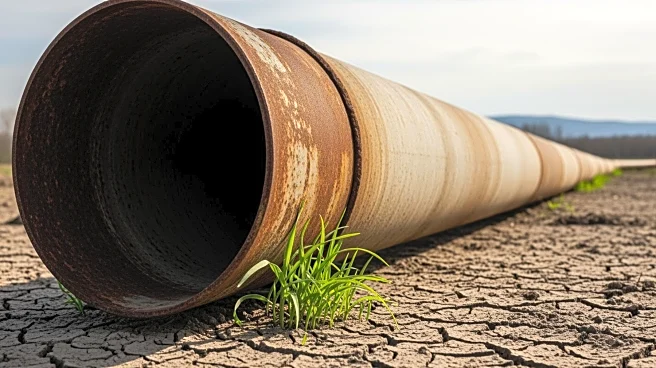What's Happening?
The East African Crude Oil Pipeline (EACOP), a $5 billion project, is now 75% complete, according to the Petroleum Authority of Uganda. The pipeline is designed to transport crude oil from Uganda's Lake Albert region to the Tanga port in Tanzania, covering
a distance of 1,443 kilometers. The project aims to export up to 246,000 barrels of crude oil per day, marking Uganda's entry into the international oil market. Despite its progress, EACOP has faced significant environmental opposition due to concerns over carbon emissions and ecological impact. TotalEnergies, the major stakeholder with a 62% share, has addressed these concerns by highlighting the project's low emission operations.
Why It's Important?
The completion of the EACOP pipeline is a significant development for Uganda, potentially transforming it into a key player in the global oil market. This could lead to increased economic growth and energy independence for the region. However, the environmental implications are substantial, with critics pointing to the potential for increased carbon emissions and ecological disruption. The project's stakeholders, including TotalEnergies and CNOOC, are under pressure to balance economic benefits with environmental responsibilities. The pipeline's completion could also influence global oil supply dynamics, particularly in the East African region.
What's Next?
Uganda plans to begin oil production from its Albertine rift basin in the second half of 2026. As the pipeline nears completion, stakeholders will likely face increased scrutiny from environmental groups and international observers. The focus will be on how Uganda and its partners manage the environmental impact while capitalizing on the economic opportunities. Additionally, the geopolitical implications of Uganda's emergence as an oil exporter could affect regional energy politics and international relations.
Beyond the Headlines
The EACOP project highlights the ongoing tension between economic development and environmental conservation. As Uganda moves closer to becoming an oil exporter, the long-term environmental impact of the pipeline and associated projects will be closely monitored. The situation underscores the need for sustainable development practices in large-scale infrastructure projects, particularly in ecologically sensitive regions.















